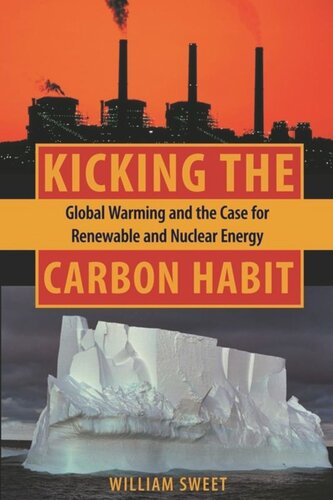

Most ebook files are in PDF format, so you can easily read them using various software such as Foxit Reader or directly on the Google Chrome browser.
Some ebook files are released by publishers in other formats such as .awz, .mobi, .epub, .fb2, etc. You may need to install specific software to read these formats on mobile/PC, such as Calibre.
Please read the tutorial at this link: https://ebookbell.com/faq
We offer FREE conversion to the popular formats you request; however, this may take some time. Therefore, right after payment, please email us, and we will try to provide the service as quickly as possible.
For some exceptional file formats or broken links (if any), please refrain from opening any disputes. Instead, email us first, and we will try to assist within a maximum of 6 hours.
EbookBell Team

4.8
54 reviewsSynthesizing information from leading scientists and the most up-to-date research, science journalist William Sweet examines what the United States can do to help prevent climate devastation. He explores advances made by climate scientists over the past twenty years and addresses the various political and economic issues associated with global warming, including the practicality of reducing emissions from automobiles, the efficacy of taxing energy consumption, and the responsibility of the United States to its citizens and the international community to reduce greenhouse gases. Timely and provocative, Kicking the Carbon Habit is essential reading for anyone interested in environmental science, economics, and the future of the planet.
With glaciers melting, oceans growing more acidic, species dying out, and catastrophic events like Hurricane Katrina ever more probable, strong steps must be taken now to slow global warming. Further warming threatens entire regional economies and the well being of whole populations, and in this century alone, it could create a global cataclysm. Synthesizing information from leading scientists and the most up-to-date research, science journalist William Sweet examines what the United States can do to help prevent climate devastation.
Rather than focusing on cutting oil consumption, which Sweet argues is expensive and unrealistic, the United States should concentrate on drastically reducing its use of coal. Coal-fired plants, which currently produce more than half of the electricity in the United States, account for two fifths of the country's greenhouse gas emissions of carbon dioxide into the atmosphere. Sweet believes a mixture of more environmentally sound technologies-wind turbines, natural gas, and nuclear reactors-can effectively replace coal plants, especially since dramatic improvements in technology have made nuclear power cleaner, safer, and more efficient.
Sweet cuts through all the confusion and controversies. He explores dramatic advances made by climate scientists over the past twenty years and addresses the various political and economic issues associated with global warming, including the practicality of reducing emissions from automobiles, the efficacy of taxing energy consumption, and the responsibility of the United States to its citizens and the international community to reduce greenhouse gases. Timely and provocative, Kicking the Carbon Habit is essential reading for anyone interested in environmental science, economics, and the future of the planet.